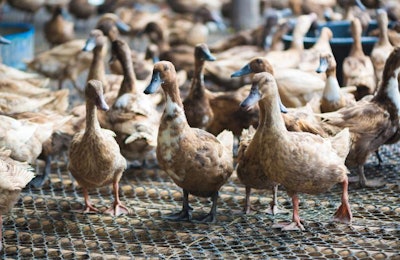
After an absence of just a few months, highly pathogenic avian influenza (HPAI) has returned to the commercial poultry sector of South Korea, and there have been new outbreaks of the disease in South Africa, Italy, Taiwan and Bulgaria.
The H5N6 variant of the virus has been confirmed at a farm with 12,000 ducks at Gochang, 300 kilometers southwest of Seoul, reports news agency, Yonhap.
Prime Minister Lee Nak-yon has ordered an immediate nationwide 48-hour ban on the movement of poultry, vehicles and farm workers to prevent further outbreaks. The restrictions will remain in place for seven days in the Gochang area.
South Korea’s last confirmed outbreak of HPAI was in mid-July of this year, but the authorities have reported the detection of H5 viruses in the droppings of wild birds in recent weeks.
After the same virus was confirmed in Japan for the first time in this winter season last week, the agriculture ministry has informed OIE of the detection of H5N6 in a further three wild birds-two ducks and a gull-found dead, also in Matsue in Shimane prefecture. No abnormalities have been observed in other wild birds in the area.
Taiwan’s ministry of agriculture has reported to the OIE that 150 goose carcasses found in the Jiali district of Tainan City a week ago have tested positive for the H5N2 HPAI virus variant. Farms within three kilometers have been placed under intensive surveillance.
South Africa’s bird flu count reaches 100 outbreaks
Recording its first cases of H5N8 HPAI in June of this year, South Africa has now recorded a further four outbreaks, bringing its total to 100.
According to the animal health agency’s report to the World Organisation for Animal Health (OIE), there were two previously unreported outbreaks of the disease at commercial ostrich farms in Western Cape Province, resulting in 39 confirmed cases out of 1,733 birds.
In the same province, an exotic goose in Cape Town and a flock of 37 hobby chickens in Drakenstein also tested positive for the H5N8 HPAI virus during October.
Europe: New outbreaks in Italy, Bulgaria
Three new outbreaks of HPAI linked to the H5N8 virus variant were confirmed in Italy in the last week. These bring the country’s number of outbreaks so far this year to 79, according to Italian health authority and research organization for animal health and food safety (IZSVe).
All of the latest cases were in the province of Brescia in Lombardy, and affected a total of more than 85,000 poultry, all of which have been humanely destroyed. Two of the outbreaks were in laying hens, at farms near to previous outbreaks. At one farm, birds in one of two houses showed a small reduction in feed intake and a sharp drop in egg production. The other outbreak was in a broiler flock, where there was a sudden spike in mortality, according to IZSVe.
In Bulgaria, there were two outbreaks of HPAI linked by an unidentified H5 variant at the beginning of November, according to the official report to the OIE. A total of more than 12,000 birds were lost to the disease through mortality or humane destruction, affecting a backyard flock in the province of Sliven, and a farm in neighboring Jambol. These followed an initial outbreak at a backyard in Haskovo province in mid-October.















